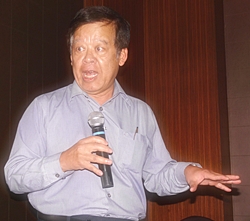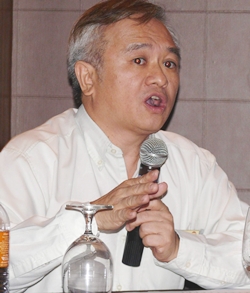Thailand’s automobile production in January significantly
increased to 140,404 units, marking the highest level in the past four
months since the flood submerged a number of provinces in October, according
to the Federation of Thai Industries (FTI).
FTI Automotive Industry Club spokesman Surapong
Paisitpattanapong announced on Wednesday that January’s figure was up 41.21
percent from December but fell by 3.98 percent year-on-year.
Last year’s devastating flood in the central provinces,
where many industrial estates are located, led to a shortage of parts to be
supplied to automobile assembly plants and slashed the country’s auto
production.
The rise was due to higher imports of auto parts from
other countries in January as plants in the country, which were earlier hit
by the flooding, have not yet been able to resume operation.
Meanwhile, 64,022 car units were manufactured for export,
or 45.6 percent of overall production, Surapong said, explaining that the
percentage dropped by 18.98 percent compared to the same period last year.
Domestic car sales in the first month of this year
totaled 76,246 units, a 11.47 percent increase year-on-year, resulting from
higher auto production for domestic sales which climbed to 76,382 units, up
from December last year.
Last month alone, automakers delivered 26,054 passenger
cars and 47,377 one-ton pick-up trucks to customers who had earlier reserved
their orders.
In a related development, the FTI projected that a number
of automobiles manufactured from February to April will grow to 465,266
units, up 12.95 percent compared to the output in February to April 2011
when auto production stood at 411,926 units.
Overall auto production this year is targeted at 2.1
million units, the spokesman said. (MCOT)
Dr. Iain Corness
The Automotive Focus Group (AFG), Thailand’s dedicated
auto interest group centered on the Eastern Seaboard, held its annual
general meeting at the Amari Orchid Resort last Friday. Coming from a
self-interest group sponsored by the Australian Chamber of Commerce Thailand
a few years ago, the group now has 116 paid-up members and is a self
sufficient stand-alone organization.

Supachai Manusphaibool.
President James Beeson addressed the members and accepted
the position as president for another year, and welcomed new members of the
executive Tony Emmett, Ken Hinckley and Ramesh Ramanathan.
Following the AGM there was a seminar on the “minimum
wage” policy as promulgated by the new Yingluck Shinawatra Pheu Thai
government.
As the ramifications of this new wage policy have not
been well understood (or explained), the AFG arranged for the members to be
addressed by Supachai Manusphaibool and Wasantachai Watanavongvisudhi in an
attempt to clarify the future handling of this thorny question.
Supachai is the publisher of the monthly “Thai Labor
Chronicle”, and before looking at the new minimum wages, he showed that it
was first important to understand the various types of “wage” definitions
between daily hire and monthly hire. The different contacts could have
wide-ranging effects on a company’s bottom line as some items were
retrospective.

Wasantachai Watanavongvisudhi.
Adding to the potential for confusion was the fact that
on April 1, 2012, the first increment comes into effect, but the increments
may be different depending upon the province. For example, Chonburi and
Rayong have significant differences. However, the first increment will be no
more than a 40% increase over each province’s current daily wage.
The second increment comes into force on January 1, 2013,
at which time all provinces should have the same B. 300 minimum (even though
the cost of living scales may be different in the different provinces).
The second speaker was Wasantachai, a partner of
International Legal Counselors of Thailand, who went further into explaining
the complexities of the Thai Labor Laws. Again the members received first
hand explanations of the Labor Laws, and how there can be some laws taking
precedent over others.
At the end, there were many questions from the floor by
the AFG members, with some having traveled great distances just to hear the
explanations given by the two speakers.
Those who are in the auto industry can get more details
from the AFG secretariat Maurice.Bromley @go-dove.com.
The international money-laundering watchdog’s decision on
blacklisting Thailand will inevitably affect foreign investors’ confidence.
Worawan Tharapoom, president of the Association of
Investment Management Companies, sees that the Financial Action Task Force
on Money Laundering (FATF) decision to include Thailand on the blacklist of
countries failing to meet international standards would definitely impact
foreign investor confidence and will affect Thailand as a whole.
The move will increase the cost for capital investment
and financial transactions, she said. It will eventually impede
international trading including opening accounts with international
financial institutions and remittances as additional documents and
clarification may be needed to identify the origin of the money and
objective of transferring money abroad, and the time taken for money
transactions will be longer.
Ms Worawan, who is also vice president of the Federation
of Thai Capital Market Organizations, suggested that the public and private
agencies involved should coordinate to speed up legislation against
money-laundering and anti-terrorist financing laws in order remove Thailand
from the blacklist as soon as possible.
The FATF added Thailand, Pakistan, Indonesia, Ghana and
Tanzania to its 12 blacklisted nations. No countries were taken off the
blacklist, but Honduras and Paraguay were removed from an intermediary
“grey-list” of countries found to be falling behind on international
standards.
The list was officially announced on Feb 20 after FATF
ended its annual meeting in France last Friday.
Meanwhile, Deputy Prime Minister/Finance Minister
Kittiratt Na Ranong expressed concern over the FATF’s decision for fear of
negative repercussions in various aspects.
The government is now waiting an official response on the
matter from the Anti-Money Laundering Office (AMLO), a concerned agency
representing Thailand at the FATF meeting in France, Kittiratt said.
AMLO has drafted two bills concerning anti-money
laundering and terrorism. He said that the government would consider whether
there is any problem with the legislation procedures. (MCOT)

